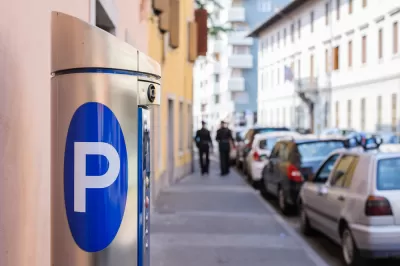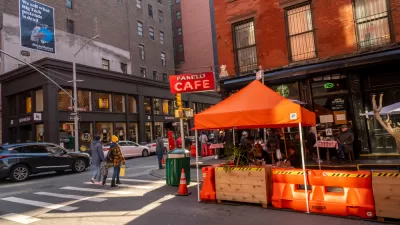In spite of concerns from business owners about losing parking, research shows that retail benefits from better bike and pedestrian infrastructure.

According to an article by David Zipper, "a growing body of evidence suggests that retailers ultimately come out ahead if their neighborhood becomes more inviting to shoppers arriving by foot, bike or transit." Thanks in part to pandemic-related programs that freed up street space for new uses, Zipper writes, the "privileged status that cars enjoy in urban shopping areas is being questioned as never before."
Zipper describes how various cities have repurposed former parking spaces and the reservations that some business owners still have about eliminating car parking. But data shows that business owners' fears, often based on their own experience and the assumption that most people drive to shops, are misplaced: a 2012 study in the Portland region "found that only 43% of bar patrons, 63% of restaurant customers and 58% of convenience store shoppers drove — the rest took transit, biked, or walked." In many urban settings, the customers that frequent small businesses don't drive to their destinations.
Research also shows that economic activity grows when bike infrastructure is installed. In Toronto, an analysis showed increased consumer spending after bike lanes were installed in one commercial district. Jeffrey Tumlin, the director of San Francisco’s Municipal Transportation Agency, suggests implementing small, reversible, community-informed pilot programs to ease business owners and other opponents into new street designs and show how parking conversion actually affects commerce.
FULL STORY: Note to Store Owners: Not All Holiday Shoppers Drive

Planetizen Federal Action Tracker
A weekly monitor of how Trump’s orders and actions are impacting planners and planning in America.

Maui's Vacation Rental Debate Turns Ugly
Verbal attacks, misinformation campaigns and fistfights plague a high-stakes debate to convert thousands of vacation rentals into long-term housing.

San Francisco Suspends Traffic Calming Amidst Record Deaths
Citing “a challenging fiscal landscape,” the city will cease the program on the heels of 42 traffic deaths, including 24 pedestrians.

Amtrak Rolls Out New Orleans to Alabama “Mardi Gras” Train
The new service will operate morning and evening departures between Mobile and New Orleans.

The Subversive Car-Free Guide to Trump's Great American Road Trip
Car-free ways to access Chicagoland’s best tourist attractions.

San Antonio and Austin are Fusing Into one Massive Megaregion
The region spanning the two central Texas cities is growing fast, posing challenges for local infrastructure and water supplies.
Urban Design for Planners 1: Software Tools
This six-course series explores essential urban design concepts using open source software and equips planners with the tools they need to participate fully in the urban design process.
Planning for Universal Design
Learn the tools for implementing Universal Design in planning regulations.
Heyer Gruel & Associates PA
JM Goldson LLC
Custer County Colorado
City of Camden Redevelopment Agency
City of Astoria
Transportation Research & Education Center (TREC) at Portland State University
Jefferson Parish Government
Camden Redevelopment Agency
City of Claremont





























